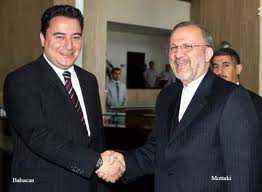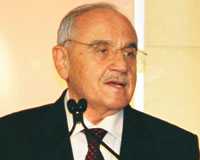Turkey’s “Economic Recovery” Raises Questions
Publication: Eurasia Daily Monitor Volume: 7 Issue: 150
August 4, 2010
By Saban Kardas
The Turkish Exporters’ Assembly (TIM) announced statistics on Turkish export figures in July 2010. Turkey exported around $9.5 billion in goods, which amounted to a 5.97 percent increase since July 2009. Between January and July 2010, its exports increased by 13.14 percent compared to the same period last year and reached $64.2 billion. Turkey’s leading export industries were in the automotive, textiles and chemicals sectors (www.tim.org.tr, August 1).
The export trends are an important indicator in order to understand the Turkish government’s handling of the economy in the face of the global economic crisis. After coming to power in 2002, the governing Justice and Development Party (AKP) managed to stabilize the Turkish economy, which had suffered from a series of home-grown financial crises throughout the 1990’s and early 2000’s. The Turkish economy reported record growth rates under the AKP’s rule, with Turkish exports surpassing the important psychological threshold of $100 billion.
However, the global financial crisis shattered this optimistic picture. Under pressure from a contracting global economy and weak domestic demand, Turkey’s production sector was badly hit, resulting in a hike in unemployment figures. With the lessons learned from earlier financial crises, however, Turkish financial institutions weathered the storm successfully. Ankara did not experience the collapse of the mortgage system or a credit crunch, and the Turkish banking sector grew even in those difficult conditions.
Nonetheless, the Turkish government came under criticism for its economic policies. For skeptics, the government could not take effective measures to protect the economy, especially through its refusal to accept international assistance (EDM, April 2, 2009). Some Turkish business groups pressured the government to conclude a stand-by agreement with the International Monetary Fund (IMF) so that it could serve as an anchor of stability and attract fresh loans to non-financial sectors. Others argued that Turkey could overcome financing problems independently without the IMF’s help. After many rounds of talks, Prime Minister, Recep Tayyip Erdogan, refused to sign a loan deal with the IMF, on the grounds that it would reduce Turkey’s flexibility to initiate appropriate measures. Instead, Erdogan’s government launched various stimulus packages to boost domestic demand and initiated a medium-term economic recovery plan (EDM, September 23, 2009).
The government’s efforts helped revitalize industrial production, easing the effects of the crisis. For a healthy recovery, however, it was necessary to expand Turkey’s export volume, given the limitations of its domestic market to sustain industrial growth alone. The trends in exports are thus a key indicator to understand the fate of Turkey’s crisis recovery policies.
Supporters of the government’s economic policy have referred to the country’s ability to avoid a major economic breakdown without outside help and the signs of recovery in recent months. In their view, through its successful road map, Turkey proved its self-sufficiency and resilience to crises, and that it could sustain this momentum without the injection of foreign capital through an IMF deal (Today’s Zaman, March 11).
Thus, Turkish government officials welcomed the recently announced export figures as further evidence that Turkey was emerging from recession. In a written statement, Turkish State Minister, Zafer Caglayan, responsible for foreign trade, interpreted these developments as signs that Turkish export levels were on the path to recovery. He analyzed the trends in exports and argued that the government will be able to reach the export volume predictions of the medium-term economic plan (www.ntvmsnbc.com, August 1).
Nonetheless, Turkish economists call for caution in evaluating Turkey’s performance in coming out of recession. For instance, a leading Turkish economist, Guven Sak, based on the results of a study conducted by the Economic Policy Research Foundation of Turkey (TEPAV), identifies a worrying pattern. He argues that although the export volume in the global economy expanded in the first quarter of 2010, Turkish exports remained rather stagnant. He reached the conclusion that while the global economy is rapidly returning to pre-crisis levels, Turkey is having difficulty catching up with these wider trends; Turkey was able to recover only 75 percent of the export volume lost due to the crisis. Thus, he called for a more effective export promotion strategy (Referans, July 29, www.tepav.org, July 28).
Indeed, reaching new markets has been a key component of the government’s recent foreign economic strategy. Caglayan and other Turkish officials have traveled extensively in order to boost Turkey’s foreign trade. For instance, Caglayan was in the US recently. Traditionally, Turkish exports to the US remained limited compared to its trade ties with the EU and Turkey now seeks to gain a larger share of the US market. Similarly, Turkey wants to form a free trade zone in the Middle East to include Turkey, Syria, Lebanon and Jordan, hoping that it might improve Turkish trade with the region. A meeting in Istanbul brought together the representatives of these countries last weekend, where they agreed further steps towards realization of this objective (Anadolu Ajansi, July 31).
The need for a more effective export-oriented growth strategy, in addition to penetrating into new markets, is also recognized by the government. In a recent meeting aimed at formulating a road map for Turkish exports, bringing together representatives from the treasury, central bank and other state institutions, Caglayan stressed that industrial products still accounts for nearly 80 percent of the country’s exports. The meeting concluded that Turkey had to reduce its dependence on the export of low and medium-technology products and move to more profitable sectors. Also, the meeting highlighted Turkey’s heavy reliance on foreign energy sources as a liability affecting its foreign trade balance (Anadolu Ajansi, July 12).
This last point highlights another major challenge facing Turkey’s economic recovery: dependence upon imports to sustain its economic growth. Parallel to the increase in domestic production and exports, Turkish imports also soared in recent months. The foreign trade deficit, which had been a prime source of concern for the Turkish economy, contracted sharply during the global financial crisis. Figures released recently show that as of June 2010 the foreign trade deficit increased by 34.9 percent since last year and Turkey’s exports are far from meeting its imports (www.tuik.gov.tr, July 30).
https://jamestown.org/program/turkeys-economic-recovery-raises-questions/
 Turkey’s foreign trade minister maintained its critical stance on valued currency saying on Wednesday that Turkey was the only country whose currency was gaining in value.
Turkey’s foreign trade minister maintained its critical stance on valued currency saying on Wednesday that Turkey was the only country whose currency was gaining in value.


